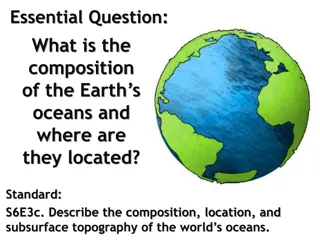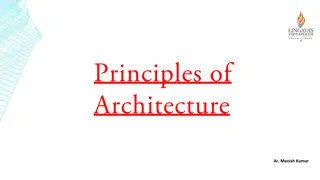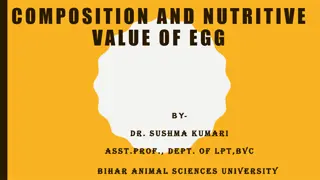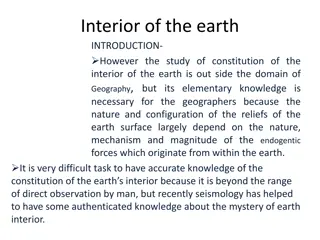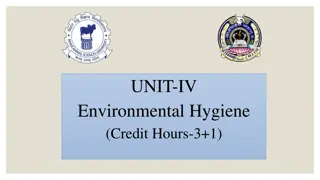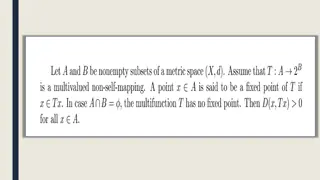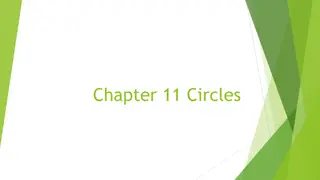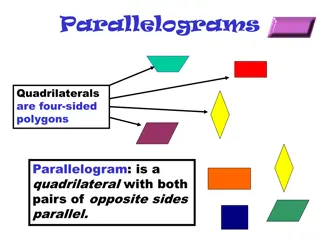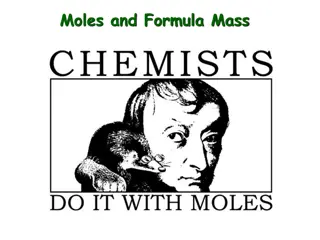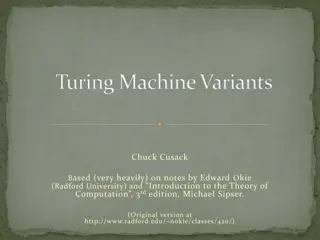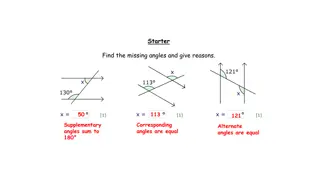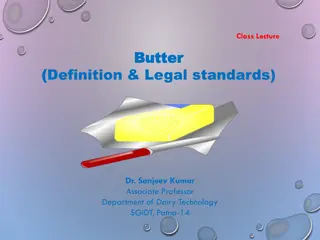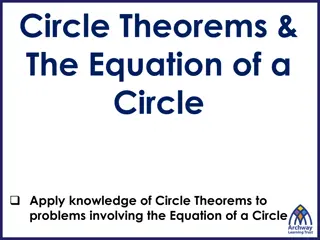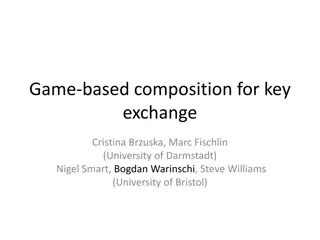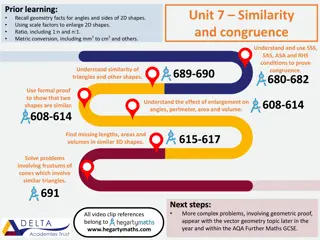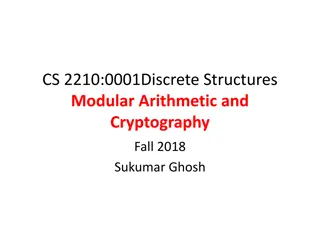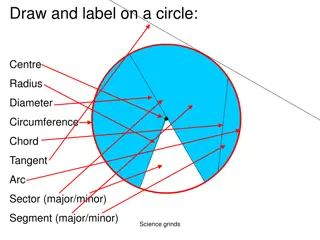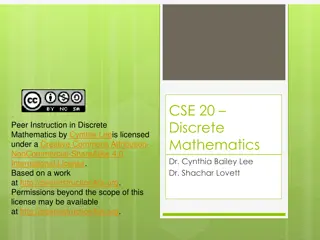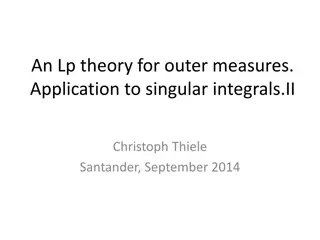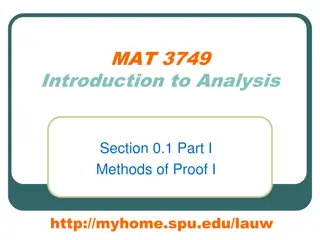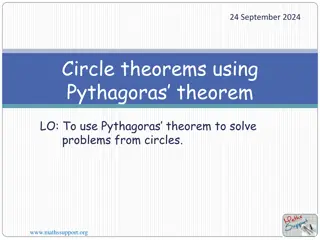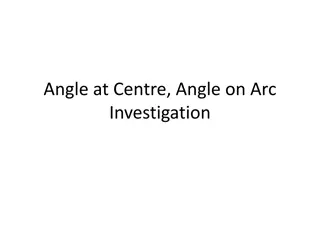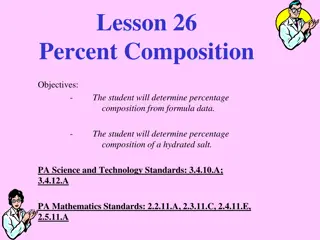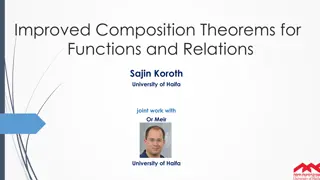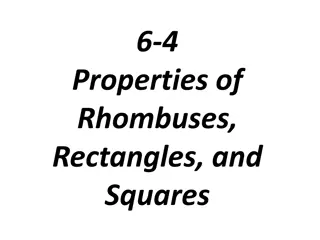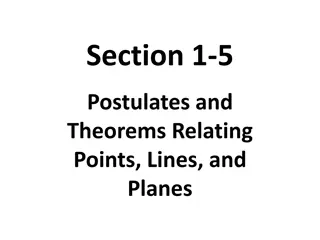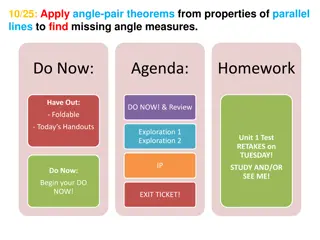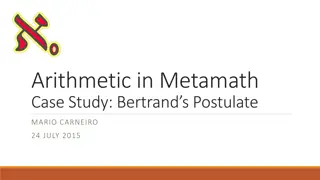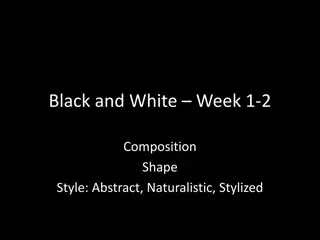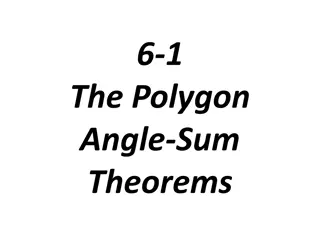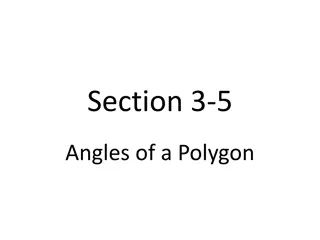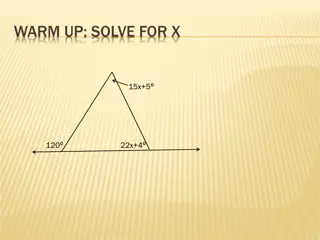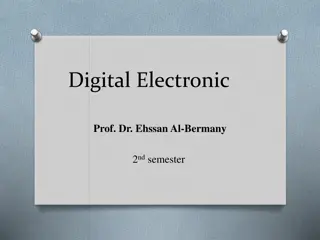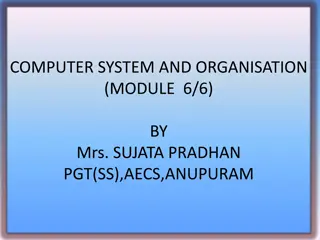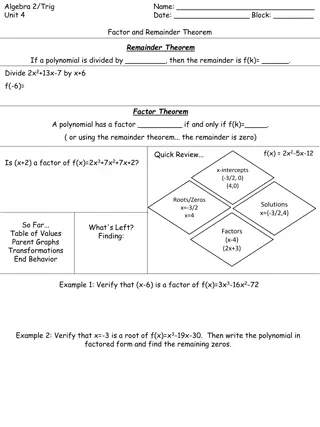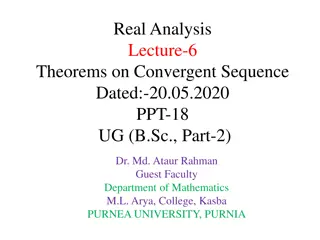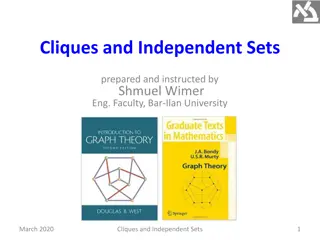Exploring the Composition of Earth's Oceans
Delve into the composition, location, and subsurface topography of the world's oceans, discovering the chemical makeup of ocean water and its vast salt content. Uncover fascinating facts such as how the salt in the oceans could create a 500-foot thick layer if spread over Earth's land surface. Engag
2 views • 16 slides
Principles of Architecture: Unity, Contrast, Mass Composition
Explore the fundamental principles of architecture focusing on unity, contrast, and mass composition. Unity emphasizes harmony among building elements, contrast adds interest without disrupting unity, and mass composition involves arranging shapes in a harmonious way. Proportion and scale play key r
0 views • 24 slides
Understanding Atmosphere Composition and Structure in Climatology
The study of climatology, focusing on the atmosphere, is presented by Dr. Banashree Saikia, covering topics such as atmospheric composition, insolation, temperature variations, atmospheric pressure, wind systems, atmospheric moisture, climatic classification, cyclones, and monsoons. The atmosphere,
1 views • 9 slides
Nutritive Value and Composition of Eggs by Dr. Sushma Kumari
The composition and nutritive value of eggs, as presented by Dr. Sushma Kumari from Bihar Animal Sciences University, cover various aspects including the physical composition of eggs, the composition of an eggshell, and the chemical composition of eggs. The presentation delves into details such as t
0 views • 19 slides
Understanding the Composition of Earth's Interior: Insights from Density, Pressure, and Temperature
The constitution of the Earth's interior plays a crucial role in shaping the surface features we observe. Although direct observation is challenging, seismic studies offer valuable insights. The density, pressure, and temperature within the Earth provide essential clues to its composition. Rocks' de
0 views • 14 slides
Understanding Environmental Hygiene: Air Pollution and Composition of Air
The content delves into the concept of atmospheric pollution, the composition of pure and impure air, sources of air pollution, and the zones of the atmosphere. It highlights the detrimental effects of pollutants on health and the environment, emphasizing the importance of environmental hygiene. The
1 views • 27 slides
Mathematical Definitions and Theorems Illustrated
In this collection of images, various mathematical concepts are visually presented, including definitions, theorems, and proofs. The slides cover a range of topics in a structured manner, providing a concise overview of key mathematical principles. From foundational definitions to detailed proofs, t
0 views • 12 slides
Understanding Circles: Tangents, Inscribed Angles, and Theorems
Explore the concept of circles in geometry, focusing on tangent lines, inscribed angles, and related theorems. Understand the properties of tangents, relationships between angles and arcs, and how to apply theorems in circle problems. Visual examples and explanations included.
1 views • 19 slides
Understanding Parallelograms: Properties, Theorems, and Tests
Parallelograms are four-sided polygons with unique properties that include having both pairs of opposite sides parallel. Explore key theorems, tests, and properties of parallelograms such as opposite side and angle congruency, diagonal bisecting, and conditions for identifying a quadrilateral as a p
1 views • 19 slides
Understanding Moles and Formula Mass in Chemistry
Dive into the world of moles, Avogadro's number, and formula mass calculations in chemistry. Learn how to convert moles to grams, grams to moles, and determine the number of atoms using Avogadro's number. Explore the concepts of formula mass and percentage composition to understand the composition o
0 views • 19 slides
Turing Machine Variants and Equivalence Theorems Summary
Explore different variants of Turing machines, such as stay-put TMs and multi-tape TMs, along with key results like the equivalence theorems. Understand the idea behind simulating multi-tape TMs with single-tape TMs and how different models are related. Dive into the proofs and implications of these
0 views • 14 slides
Geometry Investigations and Theorems
Explore various circle theorems and investigations involving angles, tangents, radii, and circumferences. Discover the relationships between angles at the center and circumference, the properties of tangents, and the angle measurements within a circle. Engage in investigations to understand the sign
6 views • 26 slides
Understanding Butter: Definition, Standards, and Composition
Explore the definition of butter according to FSSAI standards, including its composition, permitted additives, and classifications based on acidity, salt content, end-use, and manufacturing practices. Discover the nutritional composition and fatty acid profile of butter along with essential informat
0 views • 10 slides
Understanding Circle Theorems and Equations of Circles
Explore circle theorems and equations of circles in geometry, including concepts like opposite angles in cyclic quadrilaterals, angles on a straight line, and important theorems like the perpendicular bisector of a chord passing through the center of a circle. Learn how to apply these theorems to fi
0 views • 12 slides
Secure Composition of Key Exchange Protocols
Explore the game-based composition approach for key exchange protocols, focusing on ensuring security in compositions with arbitrary tasks and the universal composability of protocols. Delve into the Bellare-Rogaway security model and the details of security games in protocol analysis. Understand ke
0 views • 25 slides
Comprehensive Mathematics Prior Learning Overview
This comprehensive overview delves into key mathematical concepts, including geometry, equations, quadratics, and circle theorems. It covers topics such as similarity, congruence, vectors, and algebraic manipulation, preparing students for more complex problem-solving and geometric proofs. The conte
0 views • 6 slides
Understanding Number Theory and Cryptography for Security
Explore the significance of number theory in cryptography, focusing on modular arithmetic, divisors, prime numbers, and theorems related to them. Discover how encryption algorithms rely on large integers and techniques to handle them effectively, along with primality testing theorems and time comple
0 views • 50 slides
Exploring Circle Concepts and Theorems
Dive into the world of circles with this comprehensive guide covering important terms like center, radius, circumference, and theorems such as double angle, semicircle, and cyclic quadrilateral. Learn about isosceles triangles, tangent properties, chord relationships, and more through visual example
1 views • 21 slides
Exploring Discrete Mathematics through Graph Theory
Delve into the world of discrete mathematics with a focus on graph theory. Learn about graphs, their properties, and essential theorems. Discover how graphs model relations in various applications like network routing, GPS guidance, and chemical reaction simulations. Explore graph terminology, theor
0 views • 26 slides
An Lp Theory for Outer Measures: Application to Singular Integrals II
This discussion covers various topics such as tents (or Carleson boxes), outer measures on the open upper half-plane, sizes of functions on tents, outer essential supremum on subsets, outer Lp spaces, embedding theorems, and estimates related to Linfity-Sinfty and weak L1-Sinfty. The content delves
0 views • 34 slides
Introduction to Analysis Methods of Proof
This content introduces various methods of proof in analysis, including direct proof, counterexamples, and indirect proofs like contrapositive. It covers common notations, sets, symbols, implications, theorems, and examples with analyses. The goal is to understand how to prove or disprove theorems u
0 views • 22 slides
Understanding Circle Theorems and Pythagoras Theorem in Geometry
Explore the key concepts of circle theorems and Pythagoras theorem in geometry. Learn about the parts of a circle, properties of chords, the relationship between the radius and tangent, and how Pythagoras theorem can be applied to solve circle-related problems like finding distances and lengths. Eng
0 views • 8 slides
Circle Theorems Investigation
Explore and understand circle theorems by investigating angles on the same arc from a chord, angle at the centre, and how it relates to the angle at the arc. Follow step-by-step visual instructions to compare angles, cut them out, and discover the relationship between angles in circles.
0 views • 16 slides
Understanding Percentage Composition in Chemistry
Percentage composition is crucial in determining the elemental composition of compounds. This lesson explains how to calculate percentage composition using molar masses, illustrated with examples like copper sulfide. It also delves into hydrated salts and their significance in chemistry. Students wi
0 views • 22 slides
Advanced Concepts in Computational Theory
Explore the latest research on improved composition theorems for functions and relations, background on Boolean circuits, P vs. NP through circuits, and topics like Karchmer-Wigderson Relation, Communication Complexity, and Circuit complexity. Discover intriguing conjectures, intricate algorithms, a
0 views • 29 slides
Properties and Theorems of Rhombuses, Rectangles, and Squares
Explore the properties and theorems related to rhombuses, rectangles, and squares in geometry. Discover how diagonals behave in rhombuses and rectangles, understand angle measures, and calculate diagonal lengths in rectangles. Enhance your knowledge of special parallelograms with engaging problem-so
0 views • 10 slides
Geometric Postulates and Theorems Relating Points, Lines, and Planes
This section introduces the postulates and theorems related to points, lines, and planes in geometry. It covers basic assumptions, postulates about lines and planes, and theorems about intersections. The concept of "exactly one" and "one and only one" is emphasized, highlighting the unique relations
0 views • 10 slides
Understanding Angle Pair Theorems in Geometry
Explore the application of angle-pair theorems in finding missing angle measures using properties of parallel lines. Learn about different types of angle pairs such as vertical angles, corresponding angles, same-side interior angles, alternate exterior angles, and more through engaging activities an
0 views • 14 slides
Exploring Metamath: A Computer Language for Mathematical Proofs
Metamath is a computer language designed for representing mathematical proofs. With several verifiers and proof assistants, it aims to formalize modern mathematics using a simple foundation. The Metamath-100 project is focused on proving a list of 100 theorems, with significant progress made in prov
0 views • 17 slides
Understanding Angle Pair Theorems in Geometry
Learn how to apply angle pair theorems using properties of parallel lines to find missing angle measures. Explore concepts like corresponding angles, alternate interior angles, alternate exterior angles, and consecutive interior angles through visual aids and practice problems.
0 views • 14 slides
Understanding Composition in Art: Techniques and Examples
Explore the concept of composition in art through various styles such as abstract, naturalistic, and stylized representations. Learn about the vocabulary and skills necessary for effective composition, with examples from renowned artists like Leonardo da Vinci, Georges Seurat, and more. Discover how
0 views • 43 slides
Understanding Polygon Angle-Sum Theorems
Explore the Polygon Angle-Sum Theorems that determine the sum of interior angle measures in polygons. Learn about the Polygon Angle-Sum Theorem, number of sides in polygons, finding angle sums, and the corollary for regular polygons. Practice using the theorems to calculate interior angle measures i
0 views • 18 slides
Understanding Polygon Angles and Theorems
Explore the angles of polygons, including interior and exterior angle sums, theorems 3-13 and 3-14, properties of regular polygons, and measurements of angles in various polygon types. Discover the relationships between sides, vertices, and angles to deepen your geometric knowledge.
0 views • 18 slides
Geometry Fundamentals: Theorems and Concepts Explained
Explore essential concepts in geometry such as solving equations, perpendicular transversal theorem, triangle exterior angle theorem, angle sum theorems, polygon classification, and naming polygorgons. Learn about the interior and exterior angles of triangles and why they add up to specific measurem
0 views • 21 slides
Understanding Digital Electronics Fundamentals with Prof. Dr. Ehssan Al-Bermany
Explore the basics of digital electronics with lectures on NOR gates, exclusive-OR gates, negative AND gates, and more. Understand how these circuits are equivalent to NOR and NAND gates. Discover key theorems of Boolean algebra through De Morgan's theorems. Prepare for a deep dive into Boolean alge
0 views • 26 slides
Understanding Logic Gates and DeMorgan's Theorems in Computer Systems
Exploring the concepts of logic gates, truth tables, and DeMorgan's Theorems in computer systems. Learn about how Boolean algebra is used to analyze digital gates and circuits, the functions of Negative-AND and Negative-OR gates, and how DeMorgan's First and Second Theorems are applied through truth
0 views • 21 slides
Combinatorics Theorems and Examples with Practical Applications
Explanation of combinatorics theorems, such as the Division Rule and Rearranging with Duplicates, along with practical examples like counting anagrams and organizing pairs. The Pigeonhole Principle is also illustrated, showcasing applications in various scenarios with clear steps and outcomes.
0 views • 17 slides
Understanding Polynomial Factor and Remainder Theorems
Exploring the Factor and Remainder Theorems in algebra, including examples on verifying factors, finding roots, applying the Rational Root Test, and determining zeros of polynomials. Learn how to factor polynomials, find remaining zeros, and analyze coefficients to uncover the complete factorization
0 views • 6 slides
Theorems on Convergent Sequences with Proofs and Examples
The lecture covers theorems on convergent sequences, including the convergence of monotonic increasing and decreasing sequences when bounded. Detailed proofs for these theorems are provided, along with examples to determine if a sequence is bounded. The presentation includes step-by-step explanation
0 views • 6 slides
Insights into Cliques and Independent Sets in Graph Theory
Exploring the concepts of cliques, independent sets, and theorems in graph theory regarding enemy relationships, maximum number of edges in 3-free graphs, and properties of multipartite graphs. The propositions and theorems discussed shed light on graph structures and their properties, providing val
0 views • 32 slides
